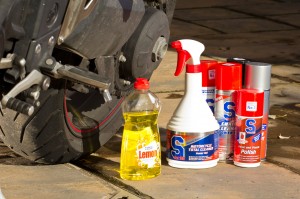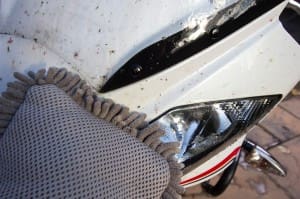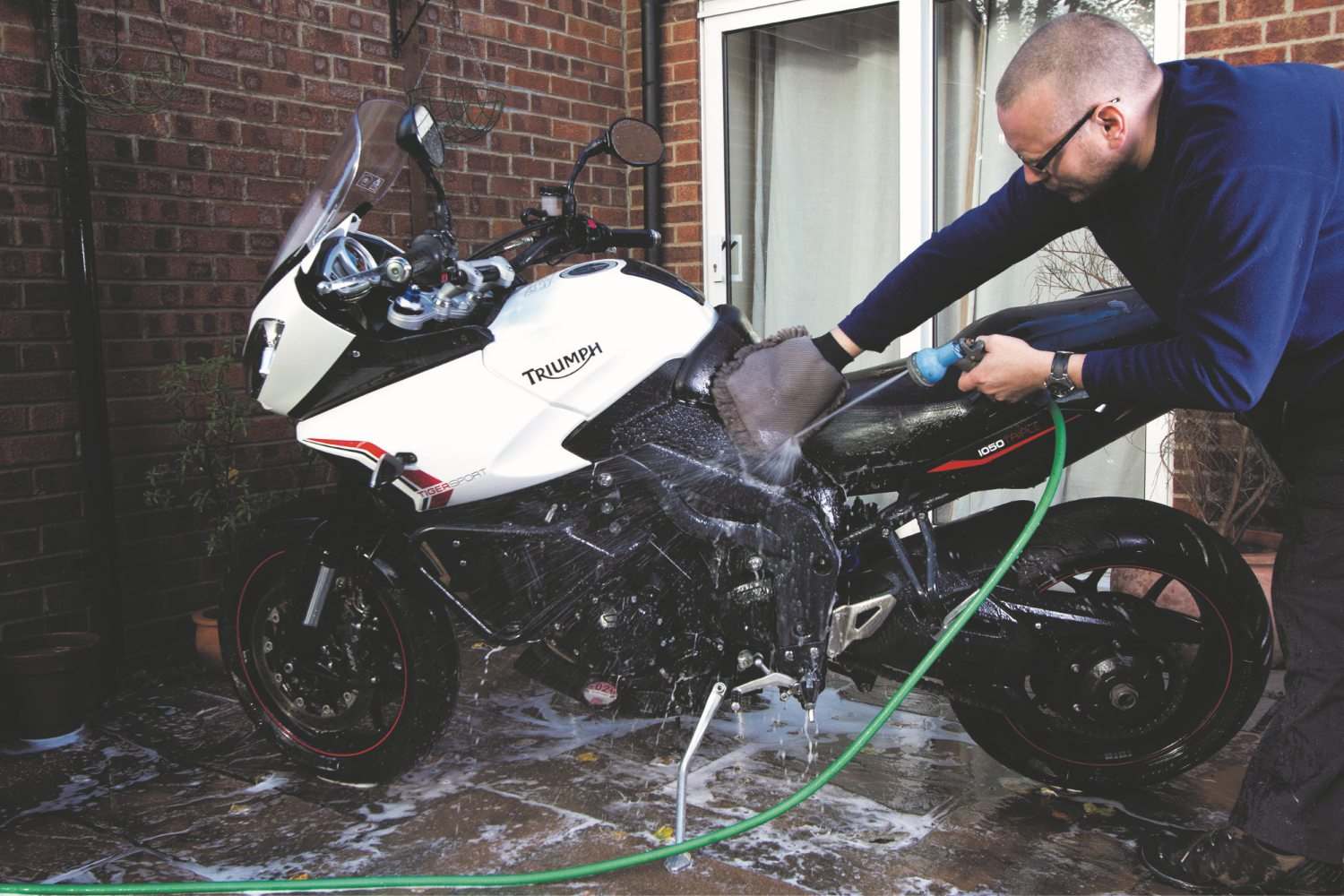It’s a question many people ask, but never seem to get a straight answer. John Milbank decided to find out, once and for all…
Chatting with MCM reader Dino Heath at a bike meet the other week, we got into a discussion on bike cleaning. Dino shines up his R1150GS with washing-up liquid, but I’d always thought this contained salts that could cause corrosion. Back in the office the next day, I found a case of cleaning kit from SDoc100, and a test was born…
 With a bucket of Tesco’s washing-up liquid and water for one side of the filthy Tiger Sport (our household budget doesn’t stretch to the big brands), and an array of posh cleaning products for the other, I started with the cheap, and very foamy option. The bike was covered with road grime, and a very unhealthy splattering of bugs on the front. Using a microfibre wash mitt, most of the general road crud floated off quite easily, but the bugs took a hell of a lot of scrubbing. It’s fair to say that I’m a bit anal when it comes to vehicle paintwork – while the Triumph’s white paint shouldn’t show rubbing marks like black can, I still prefer to be a lot more gentle than I was.
With a bucket of Tesco’s washing-up liquid and water for one side of the filthy Tiger Sport (our household budget doesn’t stretch to the big brands), and an array of posh cleaning products for the other, I started with the cheap, and very foamy option. The bike was covered with road grime, and a very unhealthy splattering of bugs on the front. Using a microfibre wash mitt, most of the general road crud floated off quite easily, but the bugs took a hell of a lot of scrubbing. It’s fair to say that I’m a bit anal when it comes to vehicle paintwork – while the Triumph’s white paint shouldn’t show rubbing marks like black can, I still prefer to be a lot more gentle than I was.
Cleaning the crevices around the engine was a little harder – it’s tricky to get the mitt into the smallest areas, and while a jetwash would help, I tend to be wary of them on unfaired bikes for fear of messing with the electrics.
Cleaning the nearside of the bike with SDoc100’s Gel Total Cleaner was a lot easier – the sticky gel hangs onto the surfaces of the bike, and can be left for between five and 15 minutes, depending how grubby it is, before spraying with a hose, and agitating with a sponge where needed. A cuppa break meant I waited the full amount of time, and the bugs did come off a lot easier. Some still needed a gentle rub, but generally they just floated clear.

Getting into the small parts of the engine and underneath the tail was much easier with the gel, although I did notice the rubber hoses had a little bit of a discoloured film over them after washing (some wax spray soon sorted this).
The problem with the Gel Total Cleaner is the price – I used nearly a third of the bottle cleaning half the Tiger, and at £15.99 a pop, that’s not to be sniffed at. To be fair, the bike was in a terrible state, and regular cleaning should see you using a lot less. Looking at the front of the bike, the difference was obvious – the offside still looked a little grubby, and I could feel bug juice as I ran my finger across the painted surface. I’d missed the odd stubborn mark on the nearside, but considering the state of the bike when I’d started, the SDoc100 had done a good job.
For details of SDoc100 products go to www.sdoc100.co.uk
Does washing-up liquid damage your vehicle? We asked Dr Bob Eden BSc MSc PhD MICorr (Member of the Institute of Corrosion) for the truth:
 “Washing up liquid does contain a ‘salt’ but this is the active ingredient and should not be confused with road salt. There is nothing in a washing-up liquid that will exacerbate corrosion – there’s no sodium chloride salt to worry about. The issue regarding corrosion is the ‘chloride’ bit of the salt. In ‘chloride nests’ at the base of a corrosion pit, the chloride exists as hydrogen chloride, which in damp conditions creates a solution of dilute hydrochloric acid, and it’s this acid that does the damage. You need to avoid ‘chloride’ from any and all sources, e.g. seawater, road grit and fish & chips (but not washing up liquid). When I wash my aluminium bodied Lea Francis, a dash of Fairy is just fine…”
“Washing up liquid does contain a ‘salt’ but this is the active ingredient and should not be confused with road salt. There is nothing in a washing-up liquid that will exacerbate corrosion – there’s no sodium chloride salt to worry about. The issue regarding corrosion is the ‘chloride’ bit of the salt. In ‘chloride nests’ at the base of a corrosion pit, the chloride exists as hydrogen chloride, which in damp conditions creates a solution of dilute hydrochloric acid, and it’s this acid that does the damage. You need to avoid ‘chloride’ from any and all sources, e.g. seawater, road grit and fish & chips (but not washing up liquid). When I wash my aluminium bodied Lea Francis, a dash of Fairy is just fine…”



